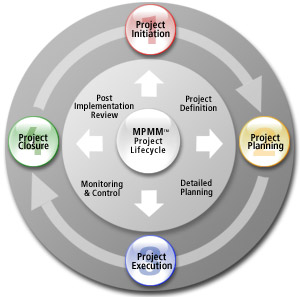Life Cycle
From apse
Back to Project Patterns
Contents |
[edit] Problem
- The life cycle is interrupted (For example Halting or Changing Horses )
- The life cycle isn't even taken into consideration when planning
- The project dies
[edit] Context
The Life Cycle is a series of stages that the project goes through from beginning to end. 
[edit] Discussion
Each project has a different life cycle. It’s almost as if each project is its own species, substantially different from all others not of its type. Some projects must be allowed to grow naturally, others must be closely controlled every step of the way. Knowing the species, and thus the life cycle of a project is difference because the life cycle of a project relies as much on the people running it as it does on the project itself. There are countless different methods to organize people and resources within a project. each variation can be looked at as having a separate life cycle. It’s your job as project manager to be aware of the different cycles and plan accordingly
Once you have the parameters of a project for example: budget, time line, workers etc. you still have to decide how your going to allow them to behave. this effects the life cycle of the project because it changes the way the project grows and evolves. For example, a very organic project might be allowed to develop without much direct control. for example if a group of people decided that they were going to build a garden a organic approach might be to give them tools and let them start work without a well drawn out plan, reasoning that whatever comes will be better then a detailed plan would have produced. Be forewarned that organic projects have a tendency to be unorganized and difficult to control especially when they are larger. the life cycle of an organic project is desirable for some projects, but often lacks the level of precision planning needed to deliver the best result. It is often tempting to use an organic style because it is easiest. Do not assume that your project is simple enough to allow an organic system to go unmonitored. even an organic plan needs to be watched to make sure it is producing an acceptable amount of output. utilizing an organic life cycle for its own sake is not beneficial. In choosing which life cycle model to go with be prepared to follow up and re evaluate especially if you selected a easy model because you did not want to have do much maintenance.
To everything there is a season, and
a time to every purpose under heaven:
A time to be born, and
a time to die;
a time to plant, and
a time to pluck up
that which is planted;
[edit] Solution
The first step is recognizing that projects even have a life-cycle. Recognizing this will assist you and your project colleagues to think in terms of conception, growth, maturity, and, even, death. Each of those phases will call for different approaches for the team or individual. A life-cycle approach should also help to encourage you to think about consequences of the project (where it might lead, for example), how to evaluate the project (both its process and its outcome), as well as how to anticipate problems.
[edit] References
[edit] External Links
[edit] Related Patterns
Planning, Project Environment, Replanning, Changing Horses, Milestones
